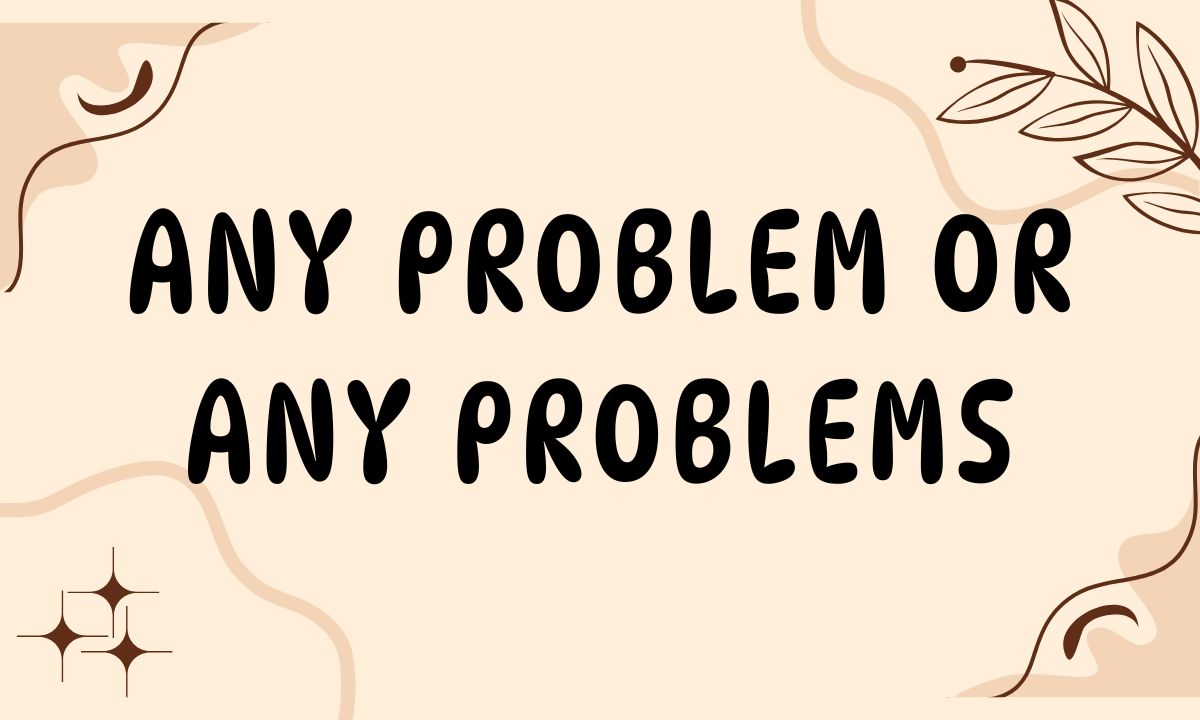Many English learners often wonder whether to say “Any problem” or “Any problems.” At first glance, both seem correct but they aren’t always used the same way. The difference depends on what you are talking about a single issue or more than one.
In grammar, “problem” is a countable noun, meaning it can appear in singular or plural form depending on context. This article will help you understand the meaning, grammatical rules, examples, and correct ways to use both forms confidently. Let’s clear up the confusion once and for all so you never hesitate while writing or speaking English.
Meaning of “Any Problem”
The phrase “any problem” refers to one issue or difficulty. It is used when talking about a single possible problem, even if we are not sure it exists. For example, when someone says, “Is there any problem?” they are asking whether there is a single issue that needs attention. It’s often used in formal or polite speech when we expect no trouble.
For instance, “If you face any problem, please contact me.” Here, “problem” means a single kind of difficulty, not multiple ones. So, use “any problem” when you are referring to one possible obstacle or situation.
Meaning of “Any Problems”
The plural form “any problems” is used when you are referring to more than one issue or when you are unsure how many problems might exist. For example, “Did you have any problems with the machine?”
Here, the speaker assumes that multiple issues could have occurred. The plural makes the sentence sound more natural in most real-life conversations, especially when we are talking generally. For instance, “Let me know if there are any problems with the delivery.” This version feels more open-ended and fits situations where many things could go wrong or need checking.
Grammatical Explanation
Grammatically, the word “problem” is countable, meaning it has both a singular and plural form. “Any” can be used with both countable and uncountable nouns, but when it appears with countable ones, you must match it with the correct form. So, “any problem” = singular, while “any problems” = plural.
The plural form is more common in modern English because it sounds natural when discussing general issues. In contrast, the singular form is slightly more specific or formal. Understanding this structure helps you avoid mistakes in writing and conversation.
READ MORE : Invision or Envision: Correct Usage, Meaning & Differences
When to Use “Any Problem”
You should use “any problem” when you are referring to one possible issue or speaking in a formal context. For example, “Please let me know if you have any problem logging in.” This sentence focuses on one task, not multiple issues. Similarly, in professional emails, “If there’s any problem with your order, contact us immediately,” sounds polite and formal.
The singular form often works best when you’re describing a single activity, question, or action. It helps express concern for a specific situation rather than a range of potential difficulties.
When to Use “Any Problems”
The phrase “any problems” fits best when talking about multiple possible issues or informal situations. For example, “Did you have any problems finding the place?” Here, you expect several possible issues, such as wrong directions or traffic delays. This version also appears in everyday conversation, making it more natural and conversational.
In customer service, teachers, or workplaces, you might hear, “Let me know if you have any problems later.” It’s a flexible, friendly way to show readiness to help. Therefore, use “any problems” when referring to general or multiple issues.
Examples in Real-Life Situations
To understand better, look at these examples:
- “Is there any problem with your card?” (one issue)
- “Are there any problems with the payment?” (multiple issues)
- “If you face any problem, let me know.”
- “She asked if I had any problems adjusting to the new job.”
The context decides which one fits better. When focusing on one issue, use the singular. But if several possibilities exist, go with the plural. Both are grammatically correct—your choice depends on meaning, tone, and setting.
Common Mistakes to Avoid
One common mistake is using “any problems” when referring to a single issue or “any problem” when many issues are expected. For example, saying “If there’s any problems” is wrong because “is” matches singular form, while “problems” is plural. The correct sentence is “If there are any problems.
” Similarly, “If there’s any problem” is correct in singular form. Always ensure subject-verb agreement matches the number of the noun. Paying attention to this small detail makes your writing clear, natural, and grammatically correct in every situation.
How to Remember the Difference
Here’s a simple trick:
👉 Use “any problem” when talking about one issue or a formal tone.
👉 Use “any problems” when talking about several possible issues or in casual speech.
Try this memory aid — “Singular = specific, Plural = possible.” This means when you expect a specific problem, use the singular. When you are unsure or expect multiple, go with the plural. Practicing these in everyday conversations will help you choose the right phrase naturally over time.
Everyday Conversations Using Both
Both forms appear naturally in everyday English. For instance, a doctor might say, “Do you have any problems sleeping?” referring to multiple health issues. But a teacher might ask, “Is there any problem with your assignment?” meaning one concern.
In spoken English, “any problems” is more frequent because it sounds softer and inclusive. You can use both forms confidently once you understand their purpose. Listening to native speakers or reading English dialogues will help you master these subtle but important differences.
Conclusion
Both “any problem” and “any problems” are grammatically correct but used in different contexts. The singular form suits specific or formal discussions, while the plural is common in general and casual speech.
Remember the key: singular for one, plural for many. Use whichever sounds more natural based on what you mean. With this clear understanding, you can confidently use both in your writing and conversations without confusion.
FAQS ABOUT Any Problem or Any Problems
What does “any problem” mean?
It means one possible issue or difficulty.
Can I say “any problems” in formal writing?
Yes, but “any problem” often sounds more formal and specific.
Which is more common in conversation?
“Any problems” is more common because it sounds natural and flexible.
Is “If there’s any problems” correct?
No. It should be “If there are any problems” to match plural form.
How can I quickly decide which one to use?
Think: one = “problem,” more than one = “problems.”








